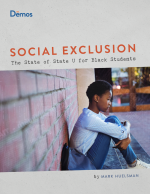 A new brief from Demos, a nonprofit organization in Washington and New York working to promote democracy and equality, has examined whether selective public colleges have made progress towards increasing the percentage of Black students on their campuses in recent years. Unfortunately, the report found that most states have very far to go in making their selective institutions representative of the population of their state.
A new brief from Demos, a nonprofit organization in Washington and New York working to promote democracy and equality, has examined whether selective public colleges have made progress towards increasing the percentage of Black students on their campuses in recent years. Unfortunately, the report found that most states have very far to go in making their selective institutions representative of the population of their state.
In the 2015-2016 school year, African-American students made up nearly 16 percent of high school graduates across the country. However, Black students made up less than 5 percent of students enrolled in large, selective public colleges and universities. At public flagship institutions, White students made up 63 percent of all students enrolled in the fall of 2016, despite representing only 52 percent of all high school graduates the previous spring.
 The largest disparities between Black high school graduates and Black college enrollments were seen in the Deep South. For example, in the state of Mississippi, Black students represented over half of all high school graduates, but only made up 13 percent of undergraduates at the University of Mississippi. White students, who represented 45 percent of Mississippi high school graduates, made up 77 percent of undergraduate enrollment at Ole Miss.
The largest disparities between Black high school graduates and Black college enrollments were seen in the Deep South. For example, in the state of Mississippi, Black students represented over half of all high school graduates, but only made up 13 percent of undergraduates at the University of Mississippi. White students, who represented 45 percent of Mississippi high school graduates, made up 77 percent of undergraduate enrollment at Ole Miss.
There were large disparities seen in other states in the South and Mid-Atlantic regions. Maryland has a 23 percent difference in the percentage of Black high school graduates and Black enrollments at the flagship campus of the University of Maryland. The disparity was 17 percent at the University of Virginia, 19 percent at the University of North Carolina at Chapel Hill, and 11 percent at the University at Buffalo of the State University of New York System.
In addition to the low enrollment of Black students at these selective public universities, the schools that do enroll large proportions of diverse students are not receiving the same funding as large public institutions. For example, the state and local support per student in 2015 at the University of North Carolina at Chapel Hill was $26,539. In comparison, at North Carolina A&T State University, a historically Black institution in Greensboro, the state and local support per student was only $10,603. Similar disparities were seen between the University of Georgia ($14,443) and historically Black Savannah State University ($4,369), as well as the University of Maryland ($17,789) and historically Black Bowie State University ($9,000).
To combat these disparities, the authors of the report suggest that institutional leaders need to change their admissions and recruitment processes to attract students from a wide array of backgrounds. They also suggest that institutions invest more in need-based financial aid than merit-based scholarships, because many students of color cannot afford to attend selective public institutions. Finally, the authors suggest that institutions should create formal processes that organize students of color around topics that those students deem most pressing and important, so that students of color can have a space to talk about injustice while also connecting with both peers and mentors.
The full study, Social Exclusion: The State of State U for Black Students, may be accessed here.

